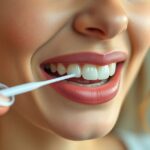As women over 40, we often juggle multiple responsibilities, leading to a range of concerns including oral health. Did you know that natural dental care can play a crucial role in maintaining not just a beautiful smile, but overall well-being? In this article, we will share essential tips focused on natural solutions to help you navigate challenges like sensitivity, gum health, and the effects of hormonal changes on your smile.
Understanding the Unique Dental Needs of Women Over 40
As women age, their bodies go through various changes, and their dental health is no exception. Women over 40 often face unique dental challenges such as increased risk of gum disease, changes in salivary flow, and a greater chance of developing cavities. These issues can be linked to hormonal fluctuations, particularly during menopause, which can lead to sensitive gums, dry mouth, and other concerns.
It’s crucial to recognize these specific needs. Maintaining oral health becomes paramount, and understanding how hormonal changes impact dental health can empower women to enhance their dental care routines effectively.
The Benefits of Natural Dental Care
Natural dental care is a wonderful approach for women over 40 looking to maintain their oral health. By choosing natural products and remedies, you not only protect your teeth and gums but also reduce exposure to harmful chemicals often found in commercial dental products.
Some benefits of natural dental care include:
- Reduced Chemical Exposure: Natural toothpaste and mouthwash often lack synthetic ingredients that may irritate sensitive gums.
- Promotes Overall Wellness: Natural ingredients often support not just dental health but overall health, thanks to their antioxidant and anti-inflammatory properties.
- Cost-Effectiveness: Many natural remedies can be made at home, reducing the need for expensive dental products.
Essential Oral Hygiene Habits for Healthy Teeth
Maintaining a robust oral hygiene routine is vital for all women, especially those over 40. Here are some essential habits to consider:
- Brush Twice a Day: Use a soft-bristled toothbrush and fluoride toothpaste to brush your teeth for at least two minutes, ensuring you reach all areas.
- Floss Daily: Flossing removes plaque and food particles between teeth where a toothbrush can’t reach.
- Use a Good Mouthwash: A natural mouthwash can help kill bacteria and strengthen gums.
- Stay Hydrated: Drinking enough water helps maintain moisture in your mouth, reducing the risk of dry mouth.
Natural Remedies for Sensitive Teeth
Sensitive teeth can be a common issue for women over 40. Fortunately, there are natural remedies that can help alleviate discomfort:
- Salt Water Rinse: Mix a teaspoon of salt in warm water and swish it in your mouth to minimize sensitivity.
- Clove Oil: Applying a drop of clove oil directly to the affected area can provide relief due to its natural numbing properties.
- Turmeric Paste: Mixing turmeric powder with coconut oil makes a paste that can help reduce inflammation and pain.
How Hormonal Changes Affect Dental Health
Hormonal changes during menopause can lead to various dental issues, including gum sensitivity and dry mouth. Estrogen and progesterone levels fluctuate significantly, impacting oral tissue health and saliva production.
Women may find themselves experiencing:
- Increased Gum Sensitivity: Hormonal shifts can make gums more prone to inflammation and bleeding.
- Dry Mouth: A decrease in saliva can lead to an increased risk of cavities and infections.
- Bone Density Loss: This can affect the jawbone, leading to further dental problems.
Understanding these changes helps women take preventive measures, ensuring they maintain good dental health throughout this transition.
The Role of Nutrition in Oral Health
Nutrition plays a significant role in maintaining healthy teeth and gums, especially for women over 40. A diet rich in vitamins and minerals can support overall dental health. Here are key nutrients to focus on:
- Calcium: Vital for maintaining strong teeth and bones; found in dairy products, leafy greens, and fortified foods.
- Vitamin D: Helps the body absorb calcium; can be found in fatty fish, fortified milk, and sun exposure.
- Vitamin C: Important for gum health; citrus fruits, strawberries, and bell peppers are excellent sources.
- Phosphorus: Works with calcium to protect and rebuild teeth; found in meats, nuts, and legumes.
Natural Mouthwashes You Can Make at Home
Creating a natural mouthwash at home is easy and can provide many benefits. Here are a few recipes:
- Salt Water Mouthwash: Dissolve a teaspoon of salt in a cup of warm water and use it as a rinse to help soothe irritated gums.
- Herbal Mouthwash: Brew a strong tea of chamomile or peppermint, let it cool, and use it as a mouthwash for its soothing properties.
- Apple Cider Vinegar Rinse: Mix one tablespoon of apple cider vinegar with a cup of water for a natural antibacterial rinse. Be sure to rinse with plain water afterward to protect enamel.
Importance of Regular Dental Check-ups
Regular dental check-ups are crucial, especially for women over 40. They allow your dentist to catch issues early before they become significant problems. During these visits, your dentist can:
- Identify Early Signs of Gum Disease: Regular evaluations can help catch periodontal issues early, allowing for prompt treatment.
- Assess Changes in Oral Health: Understanding how hormonal changes might be affecting your dental health.
- Provide Professional Cleanings: Professional cleaning helps remove tartar and plaque buildup that brushing and flossing alone may miss.
How Stress Affects Your Dental Care
Many women over 40 juggle various responsibilities, which can lead to increased stress. Stress can have a negative impact on dental health by leading to habits such as teeth grinding or neglecting oral hygiene.
Here are some ways stress can affect dental health:
- Bruxism: Grinding teeth can wear down enamel and lead to jaw pain.
- Neglecting Oral Hygiene: Busy lifestyles may result in skipping brushing or flossing.
- Weakened Immune System: Stress can compromise the immune system, making it easier for infections to occur.
Simple Daily Tips for Optimal Oral Health
Incorporating simple yet effective tips into your daily routine can significantly boost your oral health:
- Limit Sugary Foods: Reducing sugar intake can help prevent cavities.
- Avoid Tobacco: Tobacco products can lead to gum disease and oral cancers.
- Chew Sugar-Free Gum: This can help stimulate saliva production and neutralize acids.
Taking control of your dental health can empower you, helping you maintain that bright smile you deserve. Remember, it is possible to improve your dental status simply by following these easy, natural approaches. Just like many women have found their path to optimal oral health, you can too! Discover the solutions that work for you and keep your smile shining bright!






